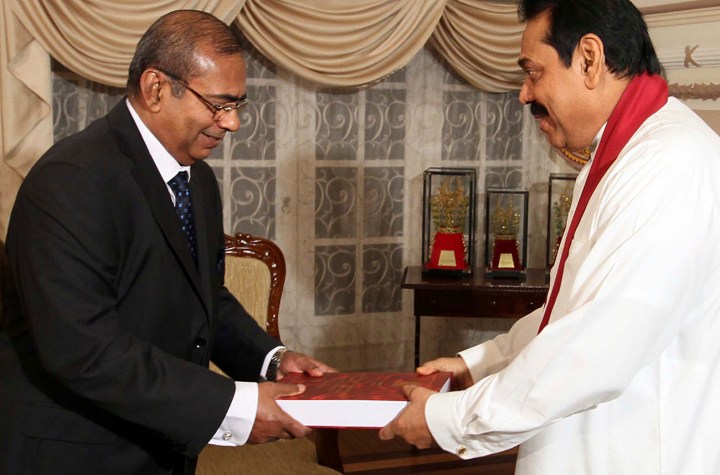Politics
Truth, reconciliation and Sri Lanka’s failure

A South African-styled truth and reconciliation commission in Sri Lanka was meant to piece together a fragmented population. It was meant to uncover whether any person, group or institution directly or indirectly bears responsibility for alleged human rights abuses. But the commission’s report is being rejected for failing to hold those responsible for human rights violations to account. By KHADIJA PATEL.
When it emerged last week that Eugene de Kock – in an effort to convince the parole board “Prime Evil” had developed remorse behind bars – had sought forgiveness from a family of one his victims, Advocate Dumisa Ntsebeza, who led evidence for the Truth and Reconciliation Commission (TRC), said the family’s decision to spurn De Kock’s plea for forgiveness must be respected. Ntsebeza says De Kock, “must now live with his own ghosts”.
And yet these are ghosts that defied exorcism by the TRC. When they refused De Kock’s invitation to visit him in prison, the family said, “We’ve seen him enough at the TRC, where he showed no remorse at all.”
There are still large pockets of this country in which these ghosts roam free. Even as apartheid is distilled into a contested memory, these ghosts haunt the nation we are today. Sure, we achieved a semblance of national reconciliation without too much fuss, but our democracy has been secure enough to bravely look these ghosts in the eye. De Kock’s plea for forgiveness is splashed across our papers with aplomb because in him, and indeed others like him, lies the residue of an ugly time.
For the relatives of ANC activist Bheki Mlangeni – who was killed by a parcel bomb in 1991 – the TRC was meant to give them closure and stave off resentment. But the TRC, successful as it was, was also flawed. “The TRC is said to have had shortcomings, and by that I mean forgiveness was not a part of the process,” Ntsebeza said of De Kock’s impassioned plea for forgiveness. Retribution would have blighted a democratic dispensation with violence so somehow we just got on with it. And no doubt the TRC was essential in helping us get on with it. We built bridges over exposed chasms. Of course, it sometimes seems we built these bridges only to complain about the potholes they’d sprung; but in South Africa there was a will, there was a way to heal.
In his book, “Shake Hands with the Devil: The Failure of Humanity in Rwanda”, General Dallaire, commander of the UN troops deployed in Rwanda during the genocide in 1994 says, “No matter how idealistic the aim sounds, this new century must become the Century of Humanity, when we as human beings raise above race, creed, colour, religion and national self-interest and put the good of humanity above the good of our own tribe. For the sake of the children and of our future. ‘Peux ce qu veux. Allons-y.’ (Where there’s a will there’s a way. Let us go for it.)” And so it was in South Africa – that invisible force still propels us forward beyond our differences, beyond our history, beyond apartheid-era policemen languishing in our jail cells.
After South Africa’s TRC, truth commissions or similar initiatives were considered or at least attempted in Cote d’Ivoire, Ghana, Sierra Leone, Liberia, Democratic Republic of Congo, Morocco, Kenya, Mauritius, Togo and Burundi with varying levels of success. Sri Lanka went one further, trying to bandage the wounds of its bloody civil war with a process similar to the TRC.
The Lessons Learnt and Reconciliation Commission (LLRC), or Commission of Enquiry, was established in May 2010 by Sri Lankan President Mahinda Rajapaksa to investigate what exactly led to the breakdown of a ceasefire agreement between the Sri Lankan government and the Tamil Tigers. The failure of the ceasefire would result in a bloody civil war between February 2002 and May 2009, leaving thousands killed and the Tamil Tigers vanquished.
Last December, the concluding report of the Commission of Enquiry was finally made public.
The LLRC then was meant to piece together a fragmented population. It was meant to uncover whether any person, group or institution directly or indirectly bears responsibility for alleged human rights abuses, particularly towards the end of the war. It was also meant to unearth lessons for the Sri Lankan people – promoting national unity and reconciliation among all communities.
It wasn’t long however before Sri Lanka’s ethnic minority Tamil party rejected the report. The Tamil National Alliance said the report by the LLRC “failed to fulfil the expectations of the Tamil community, while also falling dramatically short of international standards.”
The United States also expressed concern that the report did not fully address all the allegations of serious human rights violations during the civil war, and it is in this curiously American vein that our own government has also emerged with a stinging rebuke of the LLRC report. In a statement released this week, the department of international relations and cooperation (Dirco) says, “The report should have addressed in more detail the question of holding those people responsible for human rights violations to account.”
We don’t ordinarily go around poking our noses in the internal dramas of sovereign states, as Dirco never fails to remind us, so this LLRC report has either struck a chord with South African sensibilities or we really are becoming too American for our own good.
The LLRC has not offered to Sri Lanka the same panacea the TRC offered South Africa. For one, the LLRC was a poor compromise made by the Sri Lankan government to assuage the Sri Lankan people into believing its ability to confront the horrors of the civil war. Earlier last year, a UN-appointed panel levelled serious abuse allegations on both sides and recommended an international inquiry be set up. Among other violations, there is credible evidence of sex crimes by government forces, including video footage showing soldiers making sexual comments while handling dead, naked bodies of female suspected Tamil Tiger fighters, some with their hands bound. Even as reconstruction efforts are made through the country, there is an alarming increase in gender-based violence, as well as forced prostitution and trafficking reported in the Tamil community.
The Sri Lankan government, with LLRC report in their hands, is now expected to argue now that an international inquiry is unnecessary.
The Sri Lankan government has been under immense pressure to investigate human rights abuses during the civil war but the LLRC was not a truly investigative body, nor was it empowered to hold political elites to account. The LLRC report holds back on some of the most divisive issues in Sri Lanka, but it also contains the testimony of thousands of citizens, surveying the political landscape of Sri Lanka and inviting further discussion and debate. It is unfortunate then that the report has only been released publicly in English – excluding a substantial number of Sri Lankans from the debate. Local media have been of little help either. According to journalists working from Sri Lanka, reporting on issues critical to Sri Lankan life is muzzled.
Quite rightly, the South African government believes these impediments to frank discussions must be removed if Sri Lanka is to progress. “The solution to the challenges facing the people of Sri Lanka at this critical juncture lies in a genuine and inclusive dialogue among all the people and political parties in Sri Lanka,” Dirco says. “To this end, South Africa encourages the government and people of Sri Lanka to create a conducive environment, inside and outside Sri Lanka, that will allow for a meaningful and sustainable political settlement that will lead to a constitution that will be acceptable to all Sri Lankans.”
Once more offering our experience of negotiated peaceful settlements and reconciliation through the TRC, South Africa has positioned itself to assist the Sri Lankans. “In a spirit of partnership and cooperation, South Africa stands ready to share its experience and work with the people of Sri Lanka as they embark on this journey of building a truly reconciled and united people and nation,” Dirco says.
At the UN Human Rights Council session opening late next month, representatives of Sri Lanka’s Tamil community are set to lobby the international community to open an inquiry into the Sri Lankan civil war. It may well be a chance to ensure accountability and address the current state of insecurity in the country. The Sri Lankan government however wants to move away from the memory of the civil war as quickly as possible, not realising that the resentment burning within the Tamil community may fuel further conflict. The ghosts must be confronted. DM

Read more:
- Tamils await their peace dividend in The Globe and Mail;
- Why the media silence on Sri Lanka’s descent into dictatorship? in The Guardian.
Photo: Sri Lanka President Mahinda Rajapaksa (R) receives the report from the Lessons Learnt and Reconciliation Commission (LLRC) chairman C.R. De Silva at his official residence in Colombo, Sri Lanka, November 20, 2011. The Commission was appointed by the Sri Lankan President to review the period between the Norwegian backed ceasefire which went into effect from February 2002 and the end to the military campaign in May last year. REUTERS/Stringer


